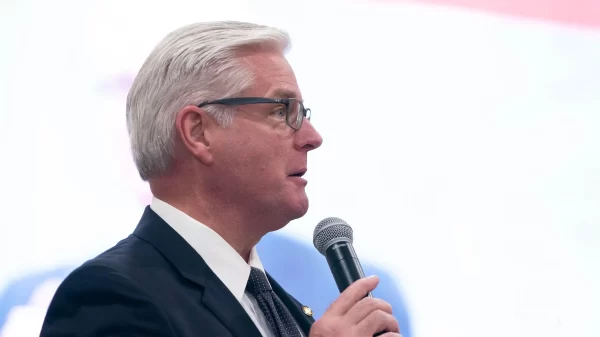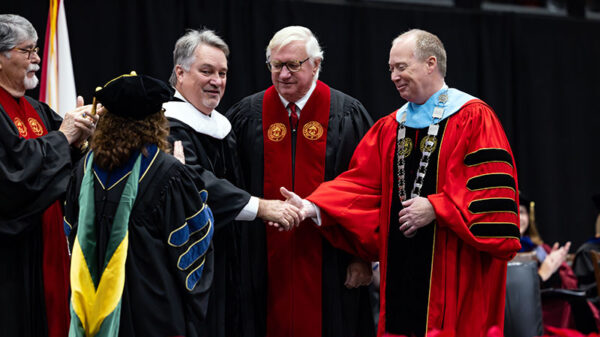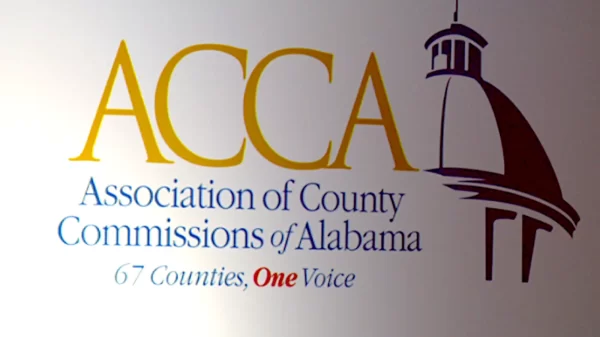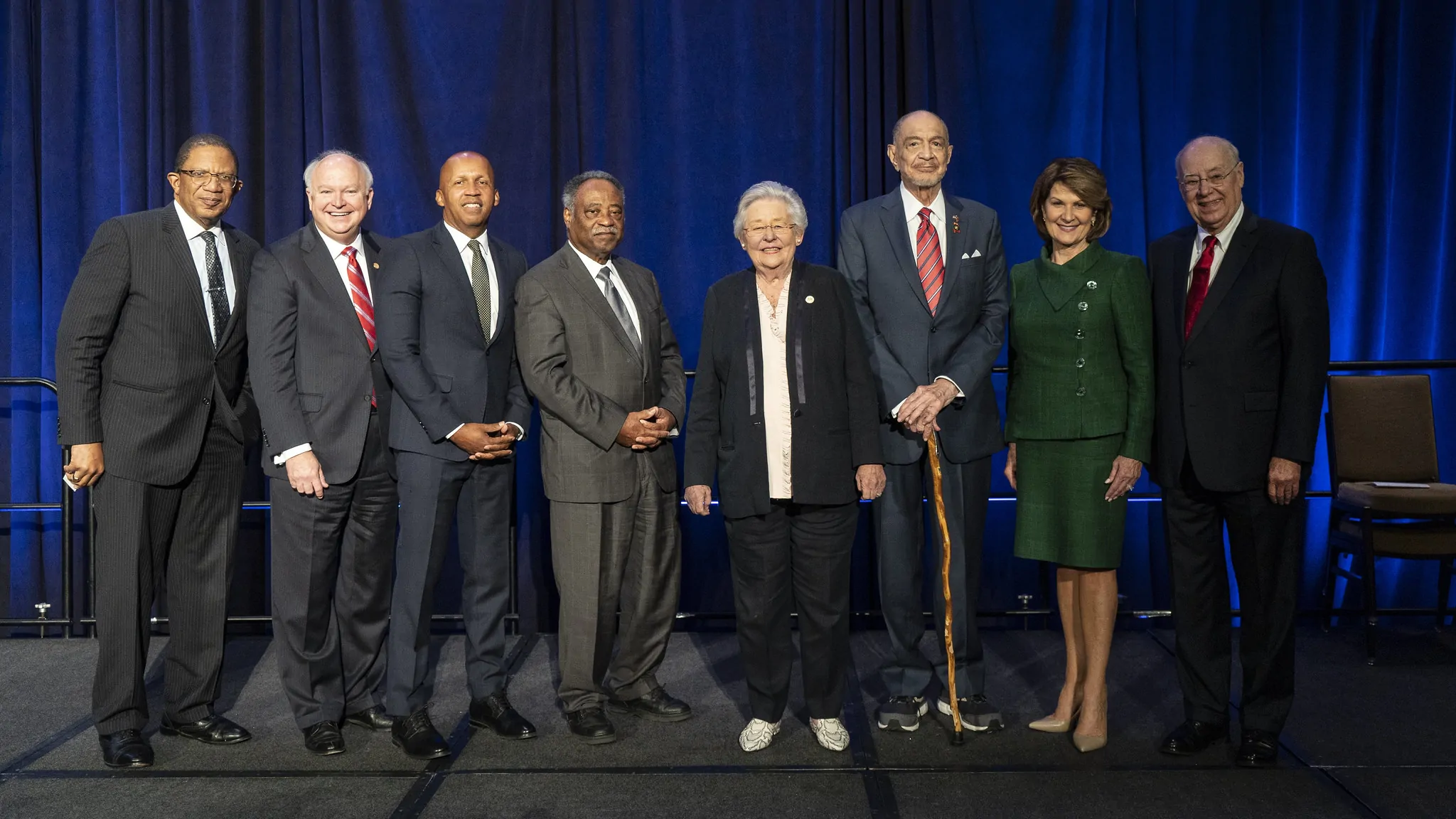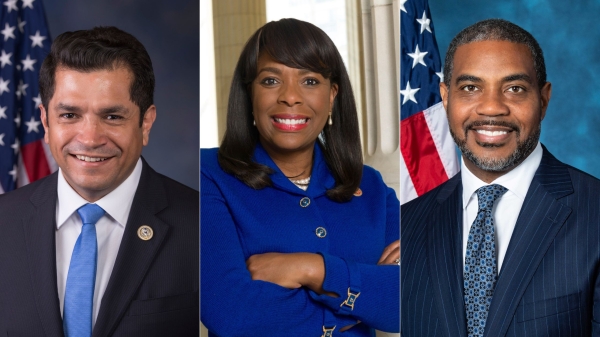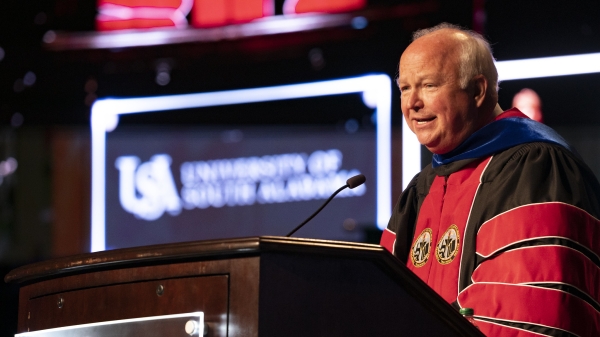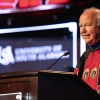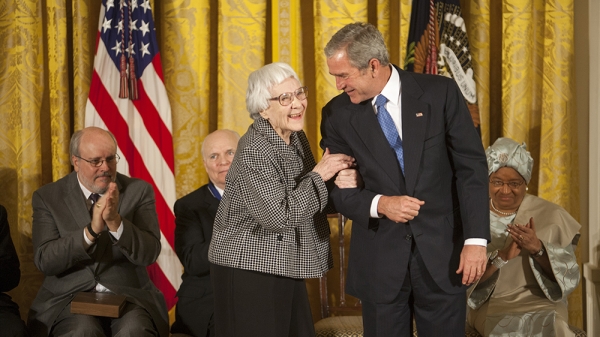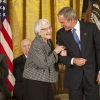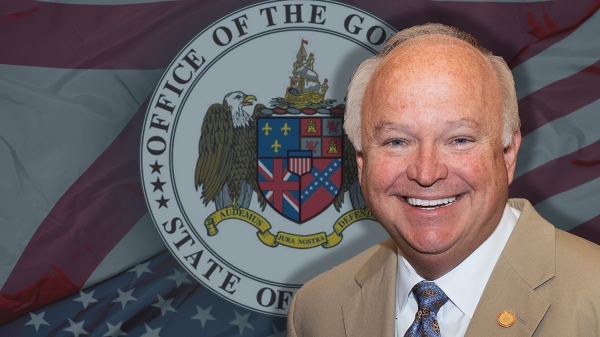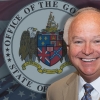The Alabama Academy of Honor inducted nine new members into its ranks Thursday in a ceremony introducing the 2020 and 2021 inductees.
Established in 1965, the Academy exists to honor 100 living Alabamians whose accomplishments and service reflect greatly on the state, plus all of Alabama’s living governors.
The 2020 inductees are Josiah “Jo” Bonner Jr., J. Gary Cooper and Bryan Stevenson. The 2021 inductees are Lloyd J. Austin III, Julian Butler, John H. England III, Marillyn A. Hewson, Lionel Richie and Selwyn Vickers.
Gov. Kay Ivey opened the ceremony, which was held in the Alabama Ballroom of the Renaissance Hotel in Montgomery.
“It’s pretty clear these inductees have made Alabama better,” Ivey said. “Each one of them, in their own ways, have moved Alabama into the future.”
2020 inductee Bryan Stevenson, founder of the Equal Justice Initiative, was chosen to address those in attendance.
Stevenson recounted his experience beginning as a student in a “colored school” before lawyers came in and forced integration, which led Stevenson to go on to high school, college and eventually Harvard law school, where he found his purpose “helping the poor get to higher ground.”
“I believe Alabama can and should be higher ground in this country,” Stevenson said. “Too much has been done to settle for the controversy and conflict and pain that seems to be all around us. I believe we are positioned in this state to represent what going to higher ground is all about.”
But in order to do that, Stevenson challenged the state will have to “get proximate to people who are suffering.”
“I think we have the capacity in this state to model what it means to get close to people who’ve fallen down,” Stevenson said. “All we need to do sometimes is wrap our arms around them and affirm their humanity and their dignity. No state in America should have a higher compassion index than Alabama. We have an unlimited capacity to be compassionate, but we’re going to have to name that as a goal and articulate that as a vision. When we do that, we begin to change things.”
Stevenson identified fear and anger as narratives that threaten the state and country.
“The real evil of American slavery was the narratvie we created to justify enslavement,” Stevenson said. “We passed the 13th amendment to end enslavement, but it said nothing about ending this narrative. And then we had a century of violence … You can be a member of the Alabama Academy of Honor and still go places in this country and have to navigate this presumption of dangerousness and guilt. You get tired.”
Stevenson warned that it will take doing uncomfortable things or inconvenient things to make progress.
“It’s not always easy to say the things that have to be said or do the things that have to be done,” Stevenson said. “But we’re standing on the shoulders of so many who have shown us how to do that.”
Each of the honorees was presented with certificates recognizing their induction and given a chance to make remarks.
Josiah “Jo” Bonner Jr.
The Academy inducted Bonner for his many political accomplishments including more than a decade in the U.S. House of Representatives, serving on the powerful House Appropriations Committee and securing economic development projects such as the multibillion dollar ThyssenKrupp Plant in Mobile County in 2007 and Airbus’ US Final Assembly Line in 2012. He was also instrumental in drafting and passing the RESTORE Act directing monies from the BP Deepwater Horizon oil spill and has served as Ivey’s chief of staff since 2018. It was announced on Nov. 10, 2021 that he will serve as the University of South Alabama’s fourth president.
“On my first trip to Washington, D.C. the leadership was having a reception for the freshman class,” Bonner said. “I looked out at the group of men and women who would soon become my friends and colleagues and I wondered to myself ‘How did some of these clowns get elected?’ I remember telling my wife, America is an amazing place that someone like that person could get elected. She said ‘They’re probably saying the same thing about you.’ Never a day would I think that about this amazing group of 100 men and women, sons and daughters in our state who have given so much and continue to give. I had to struggle to find the right words. To the men and women of the academy, I join your ranks with a heart filled with gratitude for this honor.”
J. Gary Cooper
While serving in Vietnam in 1967, he became the first Black officer in the Marine Corps to lead an infantry company into combat in Vietnam, Cooper earned a number of decorations for heroism, including the Bronze Star, two Purple Hearts for wounds received in ground action, and the Vietnam Cross of Gallantry three times. His other military decorations include the Distinguished Service Medal and the Legion of Merit. After his service in the military, Cooper served in the Alabama House of Representatives and then as commissioner of the Alabama Department of Human Resources. He served as assistant secretary of the Air Force under President George H. W. Bush and as U.S. Ambassador to Jamaica under President Barack Obama.
“I’m just a brown-skinned kid from Alabama receiving this prestigious award this evening,” Cooper said. “I am forever humble and grateful to the many many people in the academy who have helped me along the way. I encourage everyone to remember we are going through a horrible time in our community. We must stop this senseless gun violence and increase our graduation rates. Pledge your help in any way you can to change this intolerable situation.”
Bryan Stevenson
Bryan Stevenson is the founder and executive director of the Equal Justice Initiative (EJI), a human rights organization in Montgomery. Stevenson is a widely acclaimed public interest lawyer who has dedicated his career to helping the poor, the incarcerated, and the condemned.He has argued and won multiple cases at the U.S. Supreme Court, including a 2019 ruling protecting condemned prisoners who suffer from dementia and a landmark 2012 ruling that banned mandatory life-without-parole sentences for all children seventeen or younger. He led the creation of two highly acclaimed cultural sites which opened in 2018, the Legacy Museum and the National Memorial for Peace and Justice. The new national landmark institutions chronicle the legacy of slavery, lynching, and racial segregation and the connection to mass incarceration and contemporary issues of racial bias. He is the author of the critically acclaimed New York Times bestseller Just Mercy, which was awarded the Carnegie Medal by the American Library Association for the best nonfiction book of 2015. Just Mercy was adapted as a major motion picture in 2019.
Gen. Lloyd Austin III
Lloyd J. Austin III was sworn in as the 28th Secretary of Defense on January 22, 2021. Austin is the principal assistant to the President of the United States in all matters relating to the Department of Defense and serves on the National Security Council. Austin’s 41-year career in the Army included command at the corps, division, battalion, and brigade levels. He was awarded the Silver Star for his leadership of the Army’s 3rd Infantry Division during the invasion of Iraq in 2003. Seven years later, Austin assumed the duties of commanding general of United States Forces – Iraq, overseeing all combat operations in the country. After a tour as the Army’s vice chief of staff, Austin concluded his uniformed service as the Commander of U.S. Central Command, responsible for all military operations in the Middle East and Afghanistan. In this assignment, he led U.S. and coalition efforts to battle ISIS in Iraq and Syria. He retired from the Army in April 2016.
“I am absolutely humbled to be included among such an exceptional group,” Austin said. “Each inductee has done so much to make Alabama proud. I myself was born in Mobile. I’ve traveled all around the world, but I’ve always been proud to be from the great state of Alabama.”
Julian Butler
Butler served as county attorney for Madison County for thirty-five years. He served as president of the National Association of County Civil Attorneys and as a special assistant attorney general for the State of Alabama. Butler is listed in The Best Lawyers in America and Mid-South Super Lawyers. Butler was a founding member and the first chairman of the Center for Public Law and Service at the University of Alabama. He was a founding member and the second chairman of the Environmental Law Section of the Alabama State Bar.
“The wisdom and wit of my wife keeps me on the straight and narrow,” Butler said. “The University of Alabama has a slogan “Where legends are made.” Looking at the inductees on this stage, excluding myself, the motto of the Academy should be ‘Where legends have been made.’ I am honored and humbled to be a member.”
John H. England Jr.
England began practicing law in Tuscaloosa in 1974. In 1985, he won election to the Tuscaloosa City Council, where he served two terms and was chairman of the Finance and Community Development Committee. He was appointed by Gov. Jim Folsom to the Tuscaloosa County Circuit Court in June 1993 and elected to a full term in November 1994. He served in that capacity until he was appointed by Gov. Don Siegelman to the Alabama Supreme Court in September 1999. England served on the Alabama Supreme Court from September 1999 until January 2001. He returned to the Circuit Court of Tuscaloosa County in January 2001 and served until his retirement on January 18, 2021. England served on the board of trustees for the University of Alabama System for twenty-three years.
“When you gave my accomplishments I thought you would just simply name my children and sit down,” England said. “I’m so proud of each of my children and their spouses. I can say I’m not sure if what I’ve done over the 74 years of my life — I don’t know if I deserve this award but I am honored and I appreciate it. Maybe in the next 74 years I’ll do something to merit this award.”
Marillyn A. Hewson
Hewson is former chairman, president, and chief executive officer of Lockheed Martin Corporation, one of the world’s leading aerospace and defense technology companies. As CEO, Hewson led one of the most successful chapters in the company’s history.Under Hewson’s leadership, Lockheed Martin’s stock price increased by nearly 400 percent and the company set new records in sales, earnings, and other key financial metrics.Hewson’s accomplishments have been widely recognized around the globe. In 2018, she was selected by a group of her peers as Chief Executive magazine’s “CEO of the Year.” Throughout her tenure as CEO, Hewson ranked in the top five on Fortune’s “50 Most Powerful Women in Business” list, receiving the No. 1 spot in 2018 and 2019. Hewson was featured on TIME’s list of the “100 Most Influential People” in 2019 and was No. 9 on Fortune’s “Businessperson of the Year” list in 2017. She was a 2019 inductee into the Alabama Business Hall of Fame and a 2020 recipient of the Distinguished Alumni Award from the UA National Alumni Association. In 2021, Hewson received the Philip J. Klass Award for Lifetime Achievement from Aviation Week.
“I stand here for the members of Lockheed Martin— their ingenuity, their focus on excellence, their innovation allows us to excel as a company and more importantly to strengthen national security,” Hewson said. “It’s on their behalf that I stand here. To my fellow inductees, I know you have made a profound impact on this state.”
Lionel Richie
Richie, a native of Tuskegee, is an international music icon whose career has spanned decades and defied genres. With more than 125 million albums sold worldwide, Richie’s work is part of the fabric of pop music. Richie wrote chart-topping songs for eleven consecutive years during the 1970s and 1980s. Richie holds an Oscar, a Golden Globe, and four Grammy Awards. He was named the MusicCares Person of the Year in 2016 and Kennedy Center Honoree in 2017. In March 2018, Richie put his handprints and footprints in cement at the TCL Chinese Theatre IMAX in Hollywood, one of the oldest awards in Hollywood.
“I’ve been around the world,” Richie said. “When I got this glorious announcement that Alabama wants to honor you, I must tell you I had to pause. For a guy that’s been around the world so many times, my journey started right down the street. A lot of times people will say you can conquer the world but sometimes you can’t go home. What this says to me is, not only can I come home, but they’re excited for me to be home.”
Selwyn Vickers
In 1994, he joined the faculty of the University of Alabama at Birmingham (UAB) as an assistant professor in the Department of Surgery. In 2006, Dr. Vickers left UAB to become the Jay Phillips Professor and chair of the Department of Surgery at the University of Minnesota Medical School, one of the oldest and most storied departments of surgery in the country. Vickers’ lab in Minnesota was instrumental in the development of an injectable cancer drug, Minnelide, which is licensed and entered phase II trials for the treatment of pancreatic and gastrointestinal cancer testing in 2019. Since 2013, he has served as Senior Vice President of Medicine and Dean of the UAB Marnix E. Heersink School of Medicine, which, along with the UAB Health System, comprise UAB Medicine, one of the five largest public academic medical centers in the United States. As dean and senior vice president, Vickers has led the medical school’s main campus in Birmingham, as well as its regional campuses in Montgomery, Huntsville, and Tuscaloosa. He also serves as chair of UAB Medicine’s Joint Operating Leadership Committee, as well as the University of Alabama Health Services Foundation Board. On January 1, 2022, he will become CEO of the UAB Health System and the UAB/Ascension St. Vincent’s Alliance.
“I feel tremendously fortunate as a young boy from Greene and Marengo County,” Vickers said. “I was fortunate as God guided my family and myself and I inherited an understanding that education and hard work are great equalizers. My grandfather could not write his own name at 44 but taught himself and became mayor of his town … My mother is a constant learner and a constant prayer warrior for me.”










